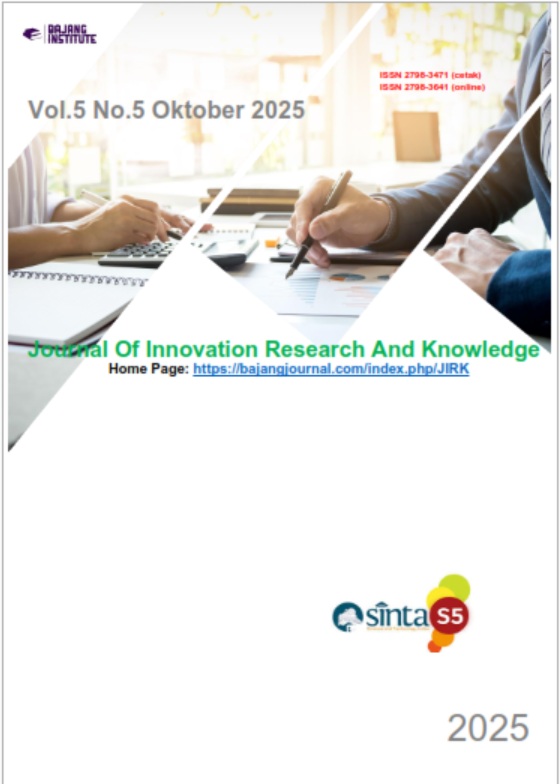SCIENTIFIC MAPPING OF THE GLOBAL TREND IN FINANCIAL LITERACY AND BEHAVIOR
Abstract
Exploring the financial literacy trend has been interesting topic, it has the crucial ro;e as the fundamental knowledge and skill for individuals in this modern economy. Wheter the individuals are employed in salaried jobs or are self employed entrepreneurs, undersatnding financial pronciples is critical to managing income, investments, and future planning. This study aims to investigate how the evolution of the financial literacy just happened, like the structure the thematic development from scholarly research on financial literacy and also financial behaviour. Employed the bibliometric methods using the biblioshiny tools as the application within the bibliometrix R-package. The data were sourced from the scopus database and spanned publication between 2020 until mid-2025 and found 1574 articles and journals. The research followed has three majorstages: data collection, organize and evolution This study found that there is the increase interest in financial literacy and behaviour, with a notable surge in publication from 2023 onwards.
References
Yadav, Mansi; BANERJI, Priyanka. A bibliometric analysis of digital financial literacy. American Journal of Business, 2023, 38.3: 91-111.
Yildirim, Ibrahim. "The effects of gamification-based teaching practices on student achievement and students' attitudes toward lessons." The Internet and Higher Education 33 (2017): 86-92.
Lusardi, A., & Mitchell, O. S. The economic importance of financial literacy: Theory and evidence. Journal of Economic Literature: (2014). 52(1), 5-44.
OECD/INFE 2020 International Survey of Adult Financial Literacy. OECD Publishing. (2020).
Goyal, K., & Kumar, S. Financial literacy in India: a review of the literature. Qualitative Research in Financial Markets. (2021). 13(1), 1-27.
Fernandes, D., Lynch Jr, J. G., & Netemeyer, R. G. Financial literacy, financial education, and downstream financial behaviors. Management Science. (2014). 60(8), 1861-1883.
Shefrin, H. Beyond Greed and Fear: Understanding Behavioral Finance and the Psychology of Investing. Oxford University Press. (2002).
Donthu, N., Kumar, S., Mukherjee, D., Pandey, N., & Lim, W. M. How to conduct a bibliometric analysis: An overview and guidelines. Journal of Business Research. (2021) 133, 285-296.
Aria, M., & Cuccurullo, C. bibliometrix: An R-tool for comprehensive science mapping analysis. Journal of Informetrics: 2017 11(4), 959-975.
Kadoya, Yoshihiko, and Mostafa Saidur Rahim Khan. "What determines financial literacy in Japan?." Journal of Pension Economics & Finance 19.3 (2020): 353-371.
Sangwan, Vikas, et al. "Financial technology: a review of extant literature." Studies in Economics and Finance 37.1 (2020): 71-88.
Alsabah, M., Alsaber, A., Alreshaid, F., Moharrak, M., & others. Exploring the Convergence of Technology Acceptance and Financial Literacy: Implications for FinTech adoption. International Review of Management and Marketing. (2025). 15(4), 45–56.
Mennekes, T., Rollin, R., Schramm-Klein, H., & Maul, F. Examining the ability of children to make competent financial decisions. Appetite. (2025). 214, 108199.
Korczak, D. The Role of Financial Education for the Prevention of Financial Misbehavior. Italian Economic Journal. (2025). 11(2), 815–833.
Cano, A., & Castro-Campos, B. The role of financial literacy in climate mitigation and sustainability education. Environmental Development. (2025). 54, 101164.
Shehadeh, M., Dawood, H. M., & Hussainey, K. Digital financial literacy and usage of cashless payments: Evidence from emerging markets. International Journal of Accounting and Information Management, (2025). 33(1), 1–20. https://doi.org/10.1108/IJAIM-03-2024-0115
Widjayanti, C. E., Adawiyah, W. R., & Sudarto. Financial literacy innovation is mediated by financial inclusion: Evidence from Indonesia. Journal of Innovation and Entrepreneurship, (2025). 14(1), 45–60. https://doi.org/10.1186/s13731-025-00525-5
Sakamoto, M., Suzuki, A., & Ishikawa, H. Association between the use of an app for providing nudges and financial management among Japanese adults. BMJ Open, (2025). 15(2), e098838. https://doi.org/10.1136/bmjopen-2025-098838















